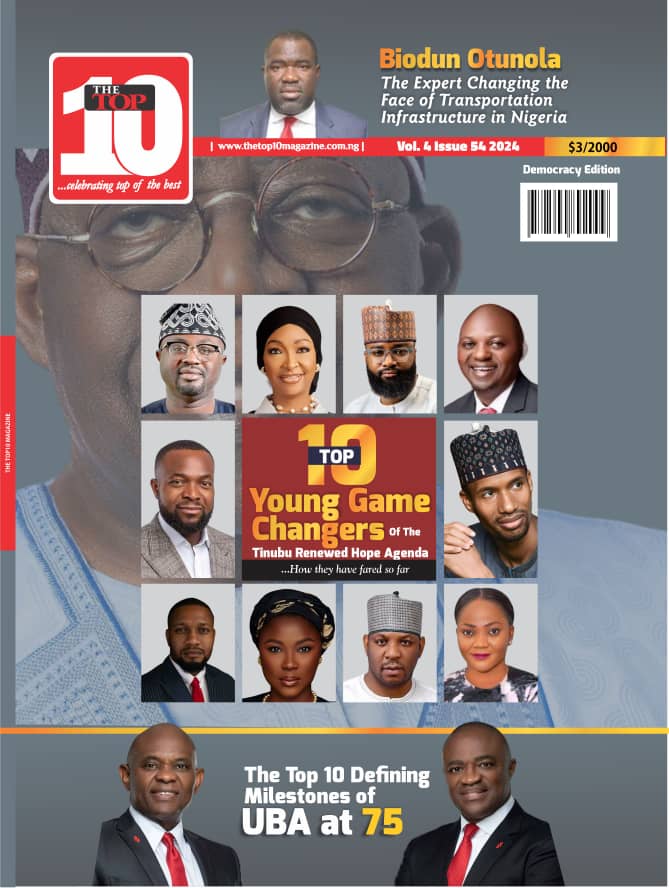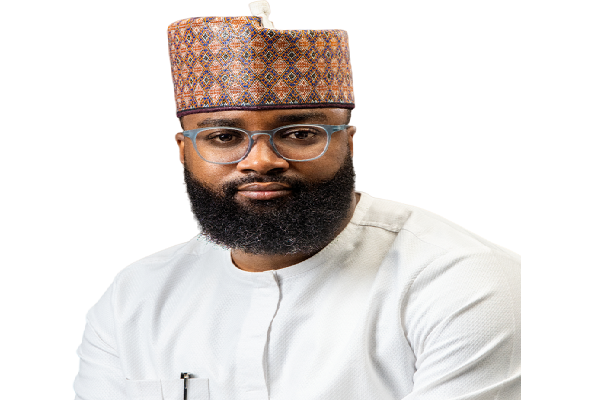Khalil Suleiman Halilu, the Executive Vice-Chairman (EVC)/Chief Executive Officer of the National Agency for Science and Engineering Infrastructure (NASENI) is a living testament to the can-do spirit of the human being.
The young man who grew upselling ice blocks to neighbours in a predominantly commercial environment with bright prospects of rising to the very top of a thriving family business had his mind fixed on an entirely different career trajectory. He worked hard at it and, today, has not only attained personal success but is now on the driving seat of his country’s aspiration to build its economy on the solid foundation of local technology.


At the age of 23, Halilu founded and co-founded several ventures, including The CANs park, an eco-friendly tech hub in West Africa; and ShapShap, an on-demand delivery App. Halilu was barely 32 when, in September 2023, President Bola Ahmed Tinubu appointed him as the EVC/CEO of NASENI, an agency in the Presidency, to implement his Renewed Hope Agenda in the area of science, engineering and local technology development.
The agency’s mandate include nurturing an appropriate and dynamic Science and Engineering infrastructure base for achieving home initiated and home sustained industrialization for Nigeria. The mandate of the Agency includes the development of relevant processes, capital goods and equipment necessary for job creation, national economic well-being and progress.
When he assumed office at NASENI), Halilu disclosed that the agency’s projection was to lift 2.5 million Nigerians out of poverty within five years, through technology transfer and its various programmes. The anticipated outcome of technology transfer to Nigeria’s economy, according to him, includes reducing import bills by 25% to 37.4 billion dollars by 2030 through partnerships that would encourage the local manufacture of the top 10 highly demanded items.
He said that the organization projects the generation of more than three million jobs by 2030 through focused technology knowledge transfer to 300,000 Small and Medium Enterprises(SMEs).
By facilitating access to technology and international markets for transactions, Halilu believes NASENI would transform Nigeria’s economy. According to him, the Agency is also building the capacity of SMEs by partnering with them to produce 35 of its market products, which was achieved within his six months in office. The products include electric tricycles, laptops, phones, lithium batteries, solar home systems, and solar irrigation equipment; three of the products have already been launched.
According to NASENI’s boss, the manufacture of the products within a short period was made possible through the agency’s initiative of deploying existing structures and technologies of local SMEs as partners to accelerate the outcomes and address local needs. He revealed that while some products are already available in the market, others had been pre-booked for release later in the year.
The four products came on the heels of the solar irrigation system, electric keke, electric motorcycle and solar-powered cargo tricycle which had earlier been unveiled during the Senate Committee on NASENI’s oversight visit earlier in the year. Halilu emphasized the growing demand for Nigerian National Brand products in the market. He underscored NASENI’s commitment to meeting this demand by ensuring its branded products reach consumers.
He said that NASENI is partnering with the Rural Electrification Agency to deploy its renewable energy technologies, particularly solar resources, in rural communities aimed at illuminating the areas.

The NASENI boss said that Nigeria could leverage its power challenges to develop solar energy technology as an alternative source of power, and also develop the minerals required for renewable energy transition such as Lithium, which the country possesses.
He disclosed that the agency had signed an agreement with a Chinese firm to build a Lithium Iron plant worth 150 million dollars, as part of Nigeria’s efforts to meet the global upsurge in energy transition.
NASENI is also working with local partners and has deployed at least 5,000 solar home systems in Nasarawa State with the aim of scaling up the intervention to other parts of the country.
According to Halilu, the organization, under its National Tractor and Vehicle Recovery programme, is reviving 55,000 broken-down tractors which would also include converting them into cleaner energy of Compressed and Liquefied Natural Gas.
The agency is also working to revive armoured personnel carriers and abandoned weapons, which was necessary to ensure they did not end up in the wrong hands.
The CEO said that the organization had launched a special fund scheme called Developing Engineering Leaders through Her (DELT-HER), to encourage women’s inclusion in the engineering sector.
In just over six months of steering the affairs of the agency, the NASENI boss has a long list of achievements to his credit. Some of them include the rolling out of 35 market-ready products; attraction of $2bn investment in Belt & Road conference as well as the establishment of a CNG conversion and training centre.
The NASENI-Portland Compressed Natural Gas (CNG) Conversion, Filling, Reverse Engineering and Training Centre, a partnership between NASENI and Portland Gas Limited, was commissioned on May 31, 2024. The state-of-the-art facility for the conversion of fossil fuel vehicles to CNG, has the capacity to convert 15 cars every two hours, translating into 2,700 conversions every month. Halilu said at the commissioning: “By our calculations, if Nigeria is able to have 10 of this kind of facility in each of the 36 States and the FCT, we will be able to convert every vehicle in the country to CNG within one year.”
President Bola Ahmed Tinubu, represented by the Senate President, Godswill Akpabio, who commissioned the Centre directed Federal Ministries, Departments and Agencies (MDAs) in the country to patronise technologies and products of NASENI to support Made-in-Nigeria goods and reduce importation.
There is also the impressive Delta 2 technology transfer programme between Nigeria & Czech Republic, the initiation of internal reforms & rebranding, which helped to attract $150m investment for battery factory from UAE as well as kick-starting of the Irrigate Nigeria project, among others.
Halilu said that NASENI under his leadership has achieved a significant milestone by signing MoUs with three Chinese organizations, a move worth billions of dollars in investments and projects. These strategic alliances with key Chinese organizations have been the bedrock of the drive to industrialize Nigeria by maximizing its full potential so that it can compete with the rest of the world in the commercialization of its products.
According to the NASENI boss, this initiative, undertaken during the Belt and Road Initiative (BRI) in Beijing, demonstrates NASENI’s commitment to fostering substantial advancements and collaborations in various sectors.
Halilu also said NASENI and the Rural Electrification Agency (REA) have reached an agreement to deploy renewable energy technologies, particularly NASENI’s solar resources, to illuminate rural areas in Nigeria. This strategic collaboration aims to enhance electricity accessibility and supply in remote regions, contributing to the country’s sustainable development.
To ease the housing deficits in the country, NASENI has signed a pivotal MoU, expanding its partnership with Family Homes Fund. This collaboration aims to advance modern and sustainable building designs for affordable housing solutions across Nigeria. The goal is to significantly reduce building material costs, enabling more Nigerians to realize their dream of homeownership.
Halilu has also actively supported the agency’s initiatives aimed at empowering youths. Notably, NASENI empowered 200 youths in Imo State on electrical installation and maintenance. In addition, collaborative efforts with National Information Technology Development Agency (NITDA) highlight a mutual focus on developing local content, both human and material, to drive economic transformation.
Halilu was born in Kano City, Kano state. He attended Rainbow Primary School in Kano from 1996 to 2001. He proceeded for his secondary school education at St. Thomas Catholic School in 2003 and completed it at Prime College in Kano in 2006. Halilu then enrolled at the University of Hertfordshire in the United Kingdom, where he obtained his bachelor of science degree in Business Administration in 2009, followed by a Master’s degree in International Business in 2010.
After graduating from university, Halilu worked as an administrative clerk at Archimode& Associates. He completed his National Youth Service Corps in Abuja.
He played a crucial role in developing the Zabe election monitoring system and founded the Center for Civic, Citizen’s Welfare And Community Development (CWCD Africa). Halilu is currently on the board of directors of Gongoni Company Limited and Scirrocco International Limited, where he served as Chief Operating Officer (COO) from 2010.
Throughout his career, Halilu has held positions such as managing director at Khash Strategic Services Ltd. in 2014, Operations Manager at ZCET Global Meter Services Ltd. in 2017, and creative director and business developer at Africa Infotech Consultancy in 2015. He also started KSH Construction & Design Ltd. in 2014 and CWCD Africa in 2018. Halilu’s notable achievements include the establishment of the CANs park in Abuja, which provides workspaces, technical and strategic consultation, and social innovation matchmaking to startups and investors from across Africa. He also founded ShapShap Logistics, operating in Lagos and Abuja, with a focus on providing localized tech solutions.
Halilu who is popularly known by the nickname “KSH” has a passion for polo and actively participates in polo tournaments and events. He contributes to the growth and development of the in Nigeria.






